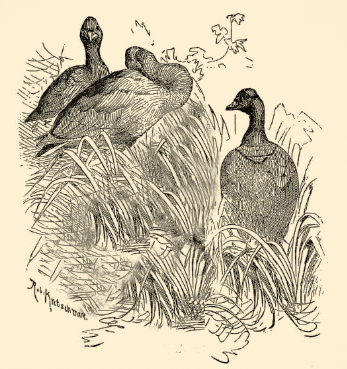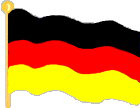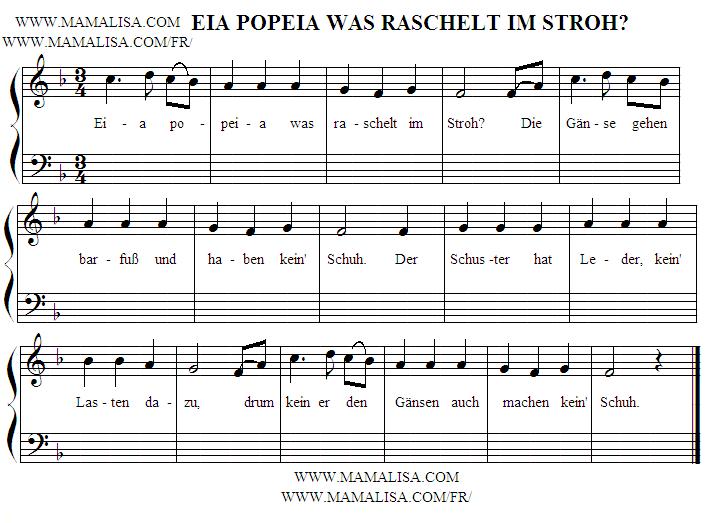Eia, popeia, was raschelt im Stroh?

Eia, popeia, was raschelt im Stroh?
Eia, Popeia, What Rustles in the Straw?
Children's Song
Children's Song
(German)
(English)
Eia, popeia, was raschelt im Stroh?
Die Gänse gehen barfuß
Und haben kein' Schuh.
Der schuster hat Leder
Kein' Leisten dazu,
Drum kann er den Gänsen
Auch machen kein' Schuh.
Eia, popeia, ist das eine Not!
Wer schenkt mir einen Dreier
fûr Zucker und Brot?
verkauf ich mein Bettlein
und leg mich auf Stroh
sticht mich keine Feder
und beißt mich kein Floh.
Eia, popeia, what rustles in the straw?
Geese go barefoot
And have no shoes.
The shoemaker has leather
But he has no shoe last*,
That's why he can't make the geese
Any shoes.
Eia, popeia, that is poverty!
Who gives me a coin**,
For sugar and bread?
I sell my little bed,
And lie on straw,
No feather pricks me,
No flea bites me.
Notes
*A shoe last is the piece of wood or metal shaped like a human foot that's used by shoemakers to mold the shoe.
**A dreier was a small coin worth 3 pfennig (= to 3 copper coins).
*****
Comments
Another Version:
Suse, liebe Suse
"Suse, liebe Suse, was raschelt im Stroh?"
Die Gänse gehen barfuß
Und haben kein' Schuh.
Der schuster hat Leder
Kein' Leisten dazu,
Drum kann er den Gänsen
Auch machen kein' Schuh.
English Translation:
Susanne, Susanne Love
"Susanne, Susanne love, what's rustling in the hay?"
The geese go barefoot
And have no shoes.
The cobbler has leather
But no shoe last,
Therefore he can't make the geese
Any shoes.
Another Version:
Wolle Gänschen
"Hai-a pa-pai-a (1), was raschelt im Stroh?"
"Das sind die Wolle Gänschen, die hab'n (2) keine Schuh (3)."
"Der Schuster hat Leder, keine Leisten dazu."
"Da [für] hab'n die Wolle Gänschen keine Schuh."
(1) Hai-a pa-pai-a = nonsense syllables
(2) hab'n = haben
(3) Schuh = Schuhen (shoes, plural)
English Translation:
Fuzzy Goslings
"Hai-a pa-pai-a what's rustling in the hay?"
"Those are the fuzzy goslings who have no shoes."
"The cobbler has leather, but no shoe last."
"So the fuzzy goslings have no shoes."

Thanks and Acknowledgements
Many thanks to Ulrike Bernhard for contributing this song and to Maguy Cabrol for translating it into French. Many thanks also to Robert W.E. Jentzsch for contributing, translating and creating the musical notation for the third version of this song. It was sung by his mother to all her kids. His mother's name is Helen Gertrud Jentzsch (nee Frisch), born in Brandenburg a. Havel, Germany, 1897; died 1976, Pueblo, Colorado, U.S.A. Translations by Lisa and Monique.
Vielen Dank!

























